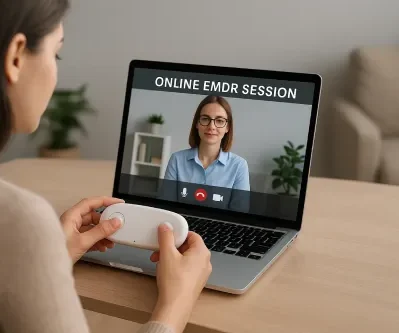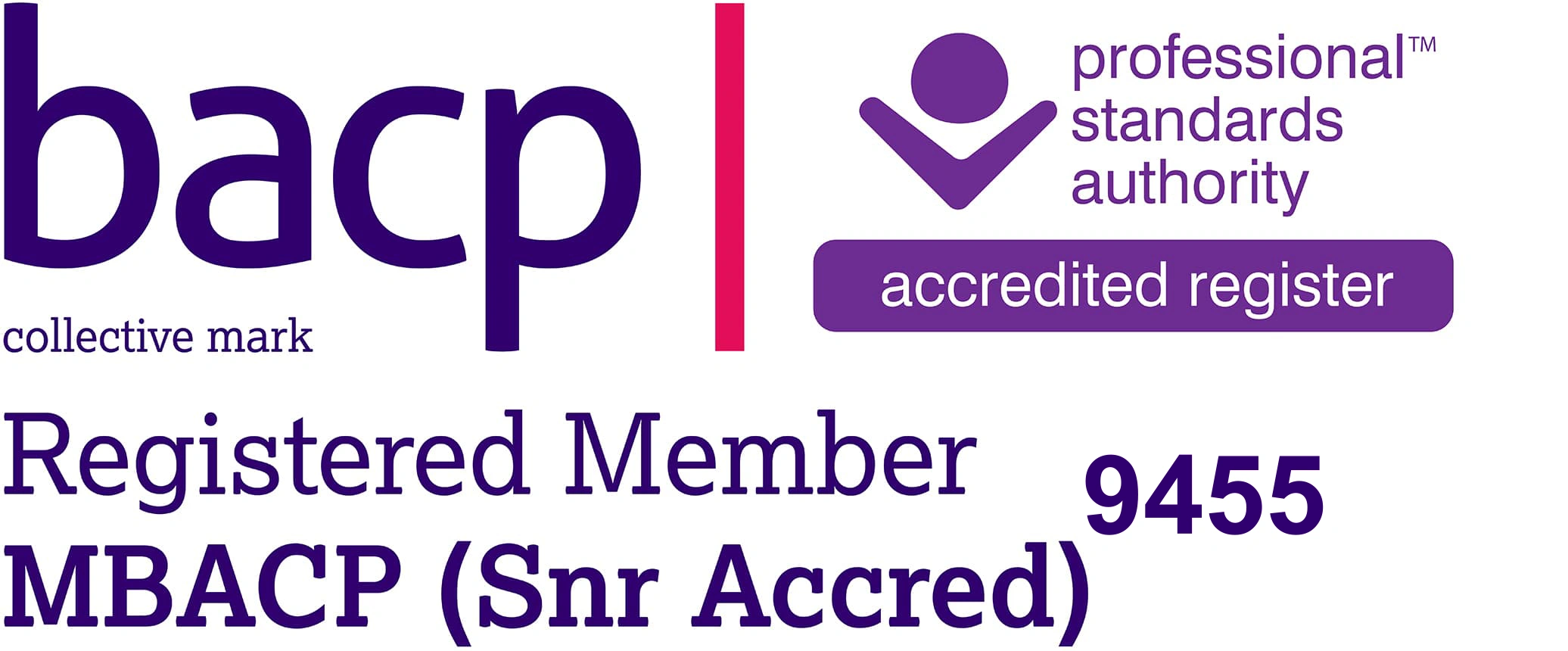Online Counselling, Psychotherapy and EMDR.
Based in Brighton

Welcome to Horizons
Therapy can be life-changing
I offer a confidential, non-judgemental and compassionate space where you can talk freely about any difficulties you may be facing. You might be feeling anxious, low, overwhelmed - and need support. I provide a consistent and supportive environment to help you to reflect, make decisions, and explore the changes you feel will help you move forward in life.
I work collaboratively with my clients to build a trusting relationship, where you can safely explore what’s troubling you—at your own pace.
Based in Brighton, I offer Online Counselling and Psychotherapy, specialising in EMDR Therapy (including Attachment Informed EMDR). I am an EMDR Europe Accredited Practitioner. I am a Senior Accredited member of both the BACP and NCPS, and my work aligns with Column C of the SCoPEd framework, reflecting advanced competencies and practice standards.
You are not alone in what you’re going through. I offer a safe, caring, and confidential space where you can talk, reflect, and grow. As an attentive and empathic listener, I’m here to support you through whatever challenges you're facing.
Counselling and Psychotherapy
Counselling and Psychotherapy are professional forms of talking therapy that help people explore and manage a wide range of emotional, psychological, and relational issues. While the terms are often used interchangeably, there can be subtle differences:
1. Counselling:
Focus: Often short to medium-term.
Purpose: Helps with specific issues like stress, grief, relationship problems, or decision-making.
Approach: Practical and problem-focused; more immediate coping strategies.
2. Psychotherapy:
Focus: Often longer-term and deeper.
Purpose: Explores long-standing patterns, emotional difficulties, trauma, or psychological disorders.
Approach: Focuses on deeper-rooted issues and how past experiences affect current behaviour.

What to Expect in a Therapy Session
I offer a free initial consultation of up to 20 minutes, for you to talk about your needs and see if I am a good fit as your therapist.
I may ask you to fill out intake forms about your background and mental health history.
During the Session
Sessions typically last for 50 minutes, and might look like this:
1. Confidentiality Explained
I will outline confidentiality and its limits (e.g., if there’s risk of harm to yourself or others). For more information about confidentiality please scroll to the bottom of this page.
2. Setting Goals
In early sessions, you'll discuss why you're seeking help and what you'd like to achieve.
3. Talking & Exploration
I’ll invite you to talk about what’s going on in your life; your thoughts, feelings, and experiences. I will listen non-judgmentally, ask questions, and may offer insights or challenges.
4. Emotional Processing
It’s normal to feel emotional, relieved, confused, or even uncomfortable — therapy often surfaces deep or difficult feelings.
Ending the Session:
Sessions usually end with a brief summary, and sometimes suggestions or reflections.
Future sessions may build on what was discussed.
How You Might Feel Afterwards:
- Relieved or lighter, especially after expressing difficult emotions.
- Tired or raw, particularly after intense sessions.
- Motivated, more aware, or uncertain — these are all valid responses
Benefits of Counselling and Psychotherapy:
- Better emotional regulation.
- Healthier relationships.
- Increased self-awareness.
- Coping strategies for stress, anxiety, or depression.
- Healing from trauma or loss
Therapy is not about someone telling you what to do — it’s a collaborative space where you’re supported in exploring yourself, your challenges and your growth. The most important factor is a trusting relationship with me, as your therapist.
Therapeutic Modalities
Qualifications & Training
Specialist Areas
I have a special interest in working with:
Neurodiversity: ADD/ADHD, Autism Spectrum
Mental Health: Anxiety, Depression, OCD, Phobias, Post-Traumatic Stress
Emotional Wellbeing: Anger Management, Bereavement, Self-Esteem, Stress, Trauma
Health & Lifestyle: Addictions, AIDS/HIV, Health-Related Issues, Eating Disorders
Relationships & Identity: LGBTQ+ Counselling, Sexual Identity, Cultural Issues
Life Transitions: Loss, Men’s Issues, Service Veterans

EMDR
EMDR (Eye Movement Desensitisation and Reprocessing) is a structured, evidence-based psychotherapy approach primarily used to help people heal from trauma and distressing life experiences. It was developed by Francine Shapiro in the late 1980s.
What is EMDR?
At its core, EMDR involves:
Recalling traumatic or distressing memories, while the therapist directs your eye movements (or sometimes uses tapping or audio tones).
This bilateral stimulation (left-right-left) is believed to help your brain reprocess those memories, making them less emotionally charged.
How Does It Work?
The theory is that traumatic memories get "stuck" in the brain in an unprocessed form. When triggered, these memories can cause intense emotional or physical responses as if the trauma is happening now.
EMDR helps to:
- Unstick and reprocess these memories
- Allow the brain to store them in a more adaptive way
- Reduce the emotional intensity and distress
This happens through eight structured phases, including history-taking, preparation, assessment, desensitisation, installation of positive beliefs, and re-evaluation.
Conditions EMDR Can Help With:
EMDR is best known for treating Post-Traumatic Stress Disorder (PTSD), but it's also been shown to help with:
- Anxiety
- Depression
- Phobias
- Grief
- Panic disorders
- Chronic pain
- Disturbing life events (e.g., bullying, medical trauma)
Is It Effective?
Yes.
EMDR is recognized as an effective treatment by organisations such as:
World Health Organization (WHO)
American Psychological Association (APA)
U.S. Department of Veterans Affairs
The UN Refugee Agency.
NICE recommends that EMDR therapy for adults should be delivered by trained practitioners with ongoing supervision, typically over 8-12 sessions (or more if clinically indicated).
For many people, EMDR can bring relief faster than traditional talk therapy, especially for trauma-related symptoms.
A Simple Analogy
Think of your brain like a file cabinet. Traumatic memories are like files thrown in unorganized, with alarms attached. EMDR helps you reorganise the files and turn off the alarms — the memory remains, but it no longer overwhelms you.
EMDR therapy online
A study published in the Journal of EMDR Practice and Research found that online EMDR therapy was just as effective as traditional face-to-face therapy in reducing symptoms of post-traumatic stress disorder (PTSD). Another study published in the Journal of Consulting and Clinical Psychology found that online EMDR therapy was effective in reducing symptoms of anxiety and depression.
Attachment-Informed EMDR
I trained in the Attachment-Informed EMDR approach with Mark Brayne at EMDR Focus. I am included in the EMDR Focus Therapist Directory.
Attachment-Informed EMDR (AI-EMDR) is a clinical approach that integrates Attachment Theory into the standard EMDR therapy model. It's designed to address not just trauma, but also deep-seated relational and developmental wounds rooted in early attachment experiences..
What Does "Attachment-Informed" Mean?
Attachment-Informed EMDR expands the traditional EMDR framework by recognising that early relationships with caregivers (secure or insecure attachment) strongly influence:
- Self-worth
- Emotional regulation
- Relationship patterns
- Core beliefs like "I am unlovable," "I'm not safe," or "I need to please others to be accepted"
These attachment-based wounds are often implicit (non-verbal or pre-verbal) and chronic, rather than stemming from single-incident trauma.
Key Features of Attachment-Informed EMDR:
1. Focus on Developmental Trauma:
- Targets relational trauma from early childhood (neglect, inconsistent caregiving, enmeshment, abandonment).
- Emphasises how unmet attachment needs shape a person's internal world.
2. Modified Targeting:
- Instead of only targeting "big T" trauma (e.g., assault, accidents), it addresses "little t" trauma, such as feeling unloved, unseen, or chronically shamed.
3. Therapeutic Relationship is Central:
- Greater attention is paid to attunement, emotional safety, and trust in the therapeutic relationship.
- The therapist may act as a kind of "earned secure base", offering corrective relational experiences.
4. Affective Resourcing:
- Clients often need more preparation and stabilisation before processing.
- Techniques like imagery, inner child work, and ego state interventions (e.g. parts work) are commonly used.
5. Pacing and Processing Adjustments:
- Processing is often slower and gentler than traditional EMDR.
- Clients may not be ready for full reprocessing until enough internal stability is built.
Who Is It For?
AI-EMDR is especially useful for clients with:
- Complex PTSD (C-PTSD)
- Developmental trauma
- Disorganised or avoidant attachment styles
- Chronic shame, low self-esteem, or relational difficulties
- History of neglect or emotional abuse
Accreditation
I am an EMDR Europe accredited practitioner, which signifies that I have demonstrated a high level of expertise and experience in EMDR therapy. This accreditation is granted by EMDR Europe, a professional organisation that sets rigorous standards for training, practice and ongoing professional development.
To achieve accreditation, practitioners typically complete specialised training that meets EMDR Europe’s criteria, accumulate supervised clinical experience with EMDR, and adhere to ethical and professional standards. This designation assures clients that the practitioner is competent and committed to delivering quality EMDR therapy in accordance with established European guidelines.
Confidentiality Statement for Counselling Sessions
Counselling sessions are private and confidential. This means that the information that you share will not be disclosed to anyone outside of the counselling service without your knowledge and consent.
However, there are some important exceptions to confidentiality.
- Risk of Harm - If you disclose information that indicates you are at serious risk of harming yourself or others, I may be required to break confidentiality to ensure safety.
- Legal requirements - In rare circumstances, I may be legally obliged to share information (for example, in relation to child protection, safeguarding vulnerable adults, or a court order).
- Supervision - To maintain good practice, I may discuss cases in professional supervision. Identifying details are kept anonymous and confidentiality is preserved.
Whenever possible, I will discuss with you any need to share information and seek your consent before doing so.
Your trust is essential to the counselling relationship and every effort is made to protect your privacy.
Get in touch
Feel free to contact me if you have any questions about how counselling works, or to arrange an initial appointment. I am happy to discuss any queries or questions you may have prior to arranging an initial appointment.
All enquires are usually answered within 24 hours, and all contact is strictly confidential and uses secure phone and email services.
£90 for a 50-minute session
48 hours' notice required (not including weekends)




